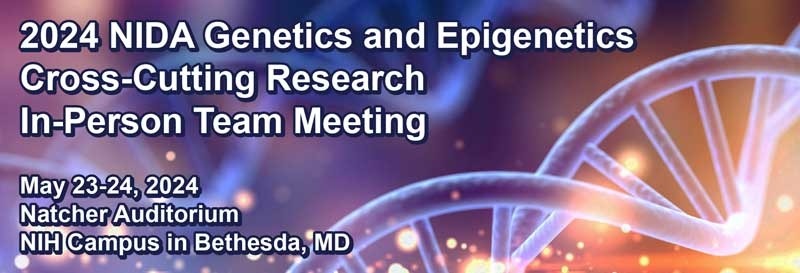Image

The Genetics and Epigenetics Cross-Cutting Research Team of the National Institute on Drug Abuse invites you to attend the May 23-24, 2024, NIDA Genetics and Epigenetics Cross-Cutting Research Team Meeting at Natcher Auditorium on the NIH Campus in Bethesda, MD. This is an in-person meeting. We expect to have more than 215 scientific presentations. Registration is open.
What We Do:
GEDN supports research on the genetics, and epigenetics, and developmental mechanisms that underlie addiction and substance use disorders.
Program Areas:
- Development of neural pathways and brain structures that mediate substance use disorders and addiction. This includes research on stem cell and progenitor cell induction, pattern formation, proliferation, and phenotypic restriction, specification of neuronal and glial cell fate, programmed cell death, guidance of glial and neuronal migration, and regulation of dendritic and axonal outgrowth, navigation, target selection, and synapse formation.
- The role that transcription factors, non-coding RNAs, scaffolding proteins, adhesion molecules, signaling molecules, cytoskeletal proteins, and other molecules play in mediating memory and learning and the neural adaptation to addictive drugs.
- Cell biology studies of addiction, including research on membrane and protein trafficking, signal transduction pathways, cytoskeletal rearrangements, protein-protein interactions, protein complex formation, synaptic vesicle formation, and ion movements.
- Genetic studies of vulnerability to addiction, including animal and human molecular genetics studies, QTL-based research, and pharmacogenetics.
- Epigenetics mechanisms of substance use disorders and addiction including chromatin modification and non-coding RNAs.
- Molecular genetics and genomics studies related to underlying biology of the response to addictive drugs, including model organism genomics, functional genomics, proteomics, gene expression studies, and mutagenesis studies.
- Bioinformatics approaches to better model the genetics of substance use disorders, including data integration, methods development, epistasis analysis, and machine learning.
Staff Research Interests:
- Jonathan Pollock, Ph.D. - Branch Chief
(301) 435-1309
Dr. Pollock manages and oversees all activities of the GEDN. Dr. Pollock advocates for genetics, epigenetics, genomics, proteomics, and developmental biology research at NIDA. The NIDA Genetics Consortium was established under his leadership and led to the discovery that the nicotinic receptors Chrna5, Chrnb4, and Chrna3 are associated with nicotine addiction, lung cancer, and peripheral artery disease. He also took a leadership role in the development of the Knockout Mouse Project. He plays an active role in the NIH BRAIN Initiative on the Cell Census. His portfolio focuses on the genetic and epigenetics mechanisms of addiction in humans and modeled in non-human organisms.
Activities: NIDA Genetics Cross-Cutting Research Team, chair; NIDA Neuroscience Consortium, GTEx working group, BRAIN cell census working group, NIH Neuroscience Blueprint Coordinating Committee - Da-Yu Wu, Ph.D. - Health Scientist Administrator
(301) 435-4649
Dr. Wu's programmatic interest is developmental neurobiology. He oversees efforts on the research in the development and plasticity of the reward and motivation pathways with particular emphasis on prenatal and adolescent period of exposure to addictive drugs, focusing on synapse growth and modulation, axonal pathfinding and neural circuitry establishment. He also has strong interests in neuronal/glial cell fate, differentiation and stem cell biology. His portfolio in addition includes areas of cell and molecular imaging, animal modeling of substance use disorders, and RNA regulation during neural development.
Activities: Member of the Trans-NIH Stem Cell Committee, NIDA AIDS Workgroup, and NIDA Genetics Workgroup. - John Satterlee, Ph.D. - DNB Coordinator for Trans-NIH Programs and Activities
(301) 435-1020
Dr. Satterlee oversees a broad range of grants and activities focused on molecular regulation of substance use disorder phenotypes including genomic, epigenomic, regulatory RNA, epitranscriptomic, and systems biology studies. This includes the use of model organisms to answer fundamental questions in substance use disorder biology and behavioral plasticity. Other areas of interest include the development of molecular technologies for imaging and manipulation of neuronal gene expression, integration and analysis of molecular datasets, extracellular vesicles, nuclear architecture, nucleosynaptic communication and intergenerational inheritance. He also oversees a program investigating molecular aspects of HIV/AIDS progression and latency and their interaction with addictive drugs.
Activities: Common Fund Roadmap Epigenomics Program (co-coordinator), International Human Epigenome Consortium (representative), CF 4D-Nucleome Program (project lead), CF Extracellular RNA Communication Program (project lead), NIH Neuroscience Blueprint Coordinating Committee, Trans-NIH Transgenerational Workgroup, NIDA Genetics Workgroup, and NIDA Neuroscience Consortium. - Amy C. Lossie, Ph.D, Health Scientist Administrator
(301) 827-6092
Dr. Lossie oversees a portfolio on genetics, epigenetics and functional studies of substance use disorders, with an interest in somatic mutations, animal models, bioinformatics (e.g. data integration, bioinformatics, statistical models, and machine learning), and functional studies (e.g. non-coding RNAs, splicing, epigenetics, transposable elements, transgenerational inheritance). She is also interested in mitochondrial dysregulation and mutations, as well as the effects of disruption of circadian rhythms on substance use disorders.
Activities: Common Fund Metabolomics; CF Illuminating the Druggable Genome; Trans-NIH Transgenerational Workgroup; Trans-NIH Mitochondrial Disease Workgroup, Chair Mitochondrial Somatic Mutations and Heteroplasmy Working Group; Genetics of Prevention Scientific Interest Group, Chair Methods Working Group; NIDA Genetics Cross-Cutting Research Team, NIDA-NIAAA Neuroscience Workgroup, NIDA Brain Development Research Consortium; NIDA Women & Sex/Gender Differences Working Group; and NIDA Diversity Supplement Committee.